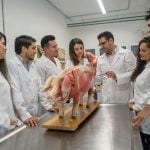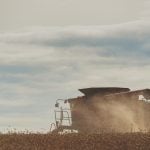The much-anticipated report from a provincial commission on the future of agriculture and agri-food in Quebec finds a sector so closed in by its regulations, systems and structures that “they are in danger of literally suffocating it.”
The report from the Commission sur l’avenir de l’agriculture et de l’agroalimentaire quebecois, released Tuesday, generally recommends that “while preserving (agriculture’s) pillars,
it is imperative to air out the system and inject
some oxygen into it so it can innovate and diversify, to form original partnerships and undertake daring new actions.”
Read Also

China seeks improved ties with Canada amid rising trade tensions
China called on Friday for steps to improve bilateral ties with Canada, saying there were no deep-seated conflicts of interest, following a spike in trade tensions with many of Beijing’s Western trade partners this year.
The commission, launched by Premier Jean Charest in June 2006 headed by former senior provincial bureaucrat Jean Pronovost, proposes forming new dialogues within the ag sector and “civil society” in general on consumers’ emerging demands.
It also proposes systems that focus on health and healthy eating, and that encourage new products, new methods, new and diversified food processing, young people entering the profession, and “pluralism in agricultural organizations” — and achieving that last by ending the monopoly of the Union des producteurs agricoles (UPA) as the province’s farmer organization.
The report outlines a “state of tension” in the province’s ag sector, as shown in its dropping farm income, “unparalleled debt level,” rising cost of certain aid programs, difficulty in intergenerational farm transfers, rising psychological distress among farmers, the erosion of consumer trust in “the entire agri-food sector,” pressures for increased market access from the World Trade Organization, the high level of concentration in the food distribution sector and the “low expectations for growth and development in Quebec’s food processing sector.”
It also describes an ag sector that receives “substantial assistance” compared to other provinces, noting that based on receipts, farmers outside supply-managed sectors would have received $179 million less in direct payments per year from 2001 to 2005 if they had been paid in the same proportion as Ontario farmers.
Among the Pronovost report’s specific recommendations for the provincial government are:
- gradually evolving the provincial Farm Income Stabilization Insurance (FISI) program into a universal support program for farm businesses, but with tighter criteria to ensure fair treatment and avoid overcompensation, with annually indexed production costs and an annual compensation cap of $150,000 per farm;
- putting this new support program into place as soon as possible for FISI-ineligible types of ag production outside of supply-managed sectors;
- allowing for additional supports outside the $150,000 basic support cap for farms dealing with certain climate conditions and difficult “biophysical characteristics,” as well as those farms taking on certain environmental farm practices;
- “strongly encourag(ing)” farmers operating under supply management to act quickly, notably by limiting and lowering the cost of quotas and by banking a portion of any quota that farmers buy or sell, to allow young farmers to enter these sectors;
- allowing producer groups to develop and market differentiated ag products, if those products are sold for higher prices than the base prices negotiated by marketing boards (which would still receive dues on the products sold);
- defining short-distribution marketing channels in which farmers could sell products directly, exempt from marketing board authority, if the selling prices in question meet or beat a base price;
- developing strategies to improve productivity in supply-managed sectors;
- making all farm support, income stabilization and property tax breaks contingent on “cross compliance” with environmental regulations, best management practices and development of a farm-level agro-environmental report;
- requiring Quebec farmers to join a professional association, to which they can reconfirm their choice at five-year intervals, and allowing new criteria to recognize “any number” of professional farmer associations, with that recognition also subject to review every five years;
- a transition assistance program for farmers or farmer groups looking to update or change production methods, such as going organic or adding a processing component;
- devoting the same annual funding level to provincial farm support programs as in each of the previous five years;
- recognizing ornamental horticulture as a full-fledged ag sector;
- developing production and marketing strategies for greenhouse vegetable production and a support strategy for organic farming;
- setting up a new commodity levy to fund research, training and development in a given ag system;
- overhauling the organization and management of Aliments du Quebec to have all Quebec products on the retail market carry the Aliments du Quebec label within three years;
- immediately modifying the board of La Financiere agricole du Quebec to comply with provincial legislation on governance of state-owned enterprises;
- having the Institut de technologie agroalimentaire (ITA) report to the ag minister rather than MAPAQ and be run by a board including farmers, processors, service firms, university representatives and others, and that ITA have a broader mandate to “continuously update” its agriculture and agri-food programming;
- encouraging farmers to undertake professional training, continuous learning and/or refresher training and make greater use of advisory services, and having Quebec’s agronomists’ organization make continuing education mandatory for all its members;
- tightening La Financiere agricole’s criteria for funding farmers’ training, with the minimum end goal of a college ag diploma or equivalent;
- developing an immigrant attraction and selection strategy for both skilled and unskilled ag workers, and improve protections for seasonal migrant workers;
- a detailed situation analysis of Quebec’s water quality for 2007-09, with periodic updates afterward; and
- strengthening the process for certification of foods with genetically modified ingredients; designating test GMO-free zones as one would for an ecological preserve; and supporting research on individual GMOs’ long-term effects.
“Protectionist vision”
Quebec’s current agriculture systems “are built on a dominant agricultural model where everything
goal was to protect Quebec agriculture from competition and the risks of innovation, whose complexities we do not always control,” the report says.
“The current crisis in the pork industry is a good example of the fate that awaits systems that do not adapt to the new realities.”
The commission proposes that the province could move on the report’s recommendations as early as this spring by preparing a new budget for the provincial ag, food and fisheries ministry (MAPAQ), revising eligibility criteria for certain ag activities for research tax credits, and working toward tighter criteria for FISI and a strategy to boost food processing investment.
On the matter of FISI reform, the report noted that the program tends to mask market signals that otherwise would urge farmers to cut costs and shift production to other commodities and “does not encourage farmers to improve.” It also noted data showing where each of Quebec’s 101 largest hog farms in 2003 collected at least $200,000 more in income stabilization than they needed, based on the production costs of much smaller farms.
“In other words, these large businesses simply took advantage of the low productivity of less successful businesses and obtained more aid than necessary,” the report said.
Detailed analysis of the commission’s proposals, and new program development from those, could follow by this autumn, the commission wrote. Major legislative decisions could follow between the spring of 2009 and 2010.
Quebec Ag Minister Laurent Lessard said in a release Tuesday that department officials were already at work examining each of the report’s recommendations for its potential impact and feasibility.
Charest, in the same release, called the report’s much-anticipated arrival an important turning point in the history of Quebec agriculture.
Parti Quebecois ag critic and former ag minister Maxime Arseneau said in a release Tuesday that the Pronovost report’s recommendations are interesting for the most part but have little to offer in the short term. The most blatant problem for Quebec farmers, he said, is the constant volatility in their farms’ net revenue.
UPA president Christian Lacasse said in Tuesday’s Montreal Gazette that while he likes many of the report’s proposals, there are only 44,000 farmers in Quebec — not enough to divide among several farm organizations if UPA’s monopoly were to be broken. About 94 per cent of Quebec farmers belong to UPA, he noted in the article.
The Gazette’s Kevin Dougherty quoted Lessard as saying UPA is “a partner” and “will remain a partner,” indicating its role wouldn’t be challenged.















